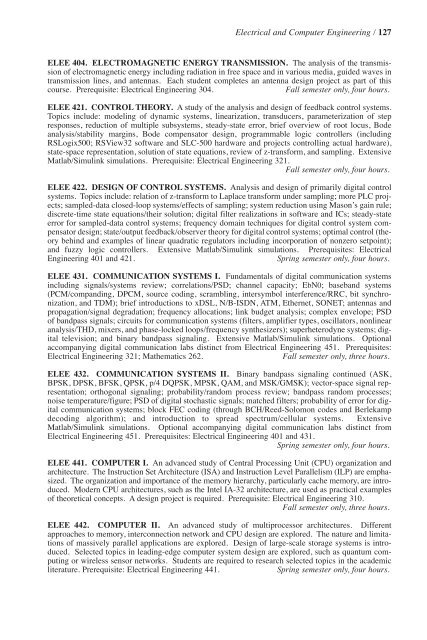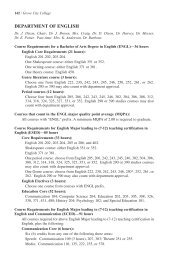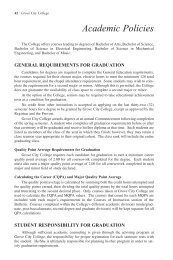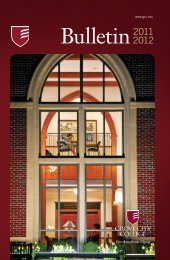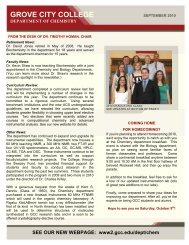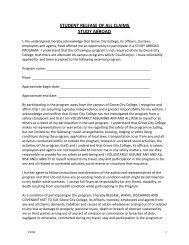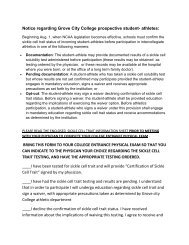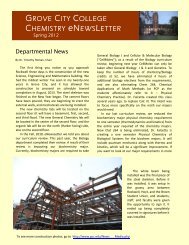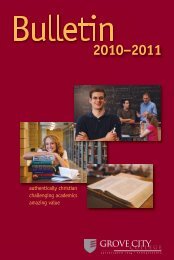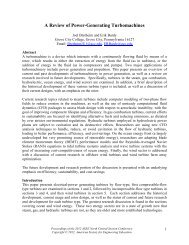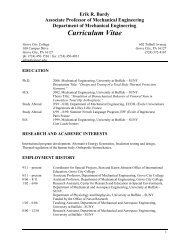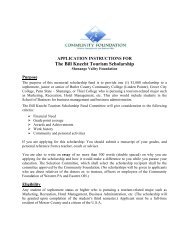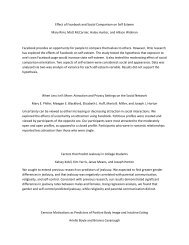2009–2010 - Grove City College
2009–2010 - Grove City College
2009–2010 - Grove City College
Create successful ePaper yourself
Turn your PDF publications into a flip-book with our unique Google optimized e-Paper software.
Electrical and Computer Engineering / 127<br />
ELEE 404. ELECTROMAGNETIC ENERGY TRANSMISSION. The analysis of the transmission<br />
of electromagnetic energy including radiation in free space and in various media, guided waves in<br />
transmission lines, and antennas. Each student completes an antenna design project as part of this<br />
course. Prerequisite: Electrical Engineering 304. Fall semester only, four hours.<br />
ELEE 421. CONTROL THEORY. A study of the analysis and design of feedback control systems.<br />
Topics include: modeling of dynamic systems, linearization, transducers, parameterization of step<br />
responses, reduction of multiple subsystems, steady-state error, brief overview of root locus, Bode<br />
analysis/stability margins, Bode compensator design, programmable logic controllers (including<br />
RSLogix500; RSView32 software and SLC-500 hardware and projects controlling actual hardware),<br />
state-space representation, solution of state equations, review of z-transform, and sampling. Extensive<br />
Matlab/Simulink simulations. Prerequisite: Electrical Engineering 321.<br />
Fall semester only, four hours.<br />
ELEE 422. DESIGN OF CONTROL SYSTEMS. Analysis and design of primarily digital control<br />
systems. Topics include: relation of z-transform to Laplace transform under sampling; more PLC projects;<br />
sampled-data closed-loop systems/effects of sampling; system reduction using Mason’s gain rule;<br />
discrete-time state equations/their solution; digital filter realizations in software and ICs; steady-state<br />
error for sampled-data control systems; frequency domain techniques for digital control system compensator<br />
design; state/output feedback/observer theory for digital control systems; optimal control (theory<br />
behind and examples of linear quadratic regulators including incorporation of nonzero setpoint);<br />
and fuzzy logic controllers. Extensive Matlab/Simulink simulations. Prerequisites: Electrical<br />
Engineering 401 and 421. Spring semester only, four hours.<br />
ELEE 431. COMMUNICATION SYSTEMS I. Fundamentals of digital communication systems<br />
including signals/systems review; correlations/PSD; channel capacity; EbN0; baseband systems<br />
(PCM/companding, DPCM, source coding, scrambling, intersymbol interference/RRC, bit synchronization,<br />
and TDM); brief introductions to xDSL, N/B-ISDN, ATM, Ethernet, SONET; antennas and<br />
propagation/signal degradation; frequency allocations; link budget analysis; complex envelope; PSD<br />
of bandpass signals; circuits for communication systems (filters, amplifier types, oscillators, nonlinear<br />
analysis/THD, mixers, and phase-locked loops/frequency synthesizers); superheterodyne systems; digital<br />
television; and binary bandpass signaling. Extensive Matlab/Simulink simulations. Optional<br />
accompanying digital communication labs distinct from Electrical Engineering 451. Prerequisites:<br />
Electrical Engineering 321; Mathematics 262. Fall semester only, three hours.<br />
ELEE 432. COMMUNICATION SYSTEMS II. Binary bandpass signaling continued (ASK,<br />
BPSK, DPSK, BFSK, QPSK, p/4 DQPSK, MPSK, QAM, and MSK/GMSK); vector-space signal representation;<br />
orthogonal signaling; probability/random process review; bandpass random processes;<br />
noise temperature/figure; PSD of digital stochastic signals; matched filters; probability of error for digital<br />
communication systems; block FEC coding (through BCH/Reed-Solomon codes and Berlekamp<br />
decoding algorithm); and introduction to spread spectrum/cellular systems. Extensive<br />
Matlab/Simulink simulations. Optional accompanying digital communication labs distinct from<br />
Electrical Engineering 451. Prerequisites: Electrical Engineering 401 and 431.<br />
Spring semester only, four hours.<br />
ELEE 441. COMPUTER I. An advanced study of Central Processing Unit (CPU) organization and<br />
architecture. The Instruction Set Architecture (ISA) and Instruction Level Parallelism (ILP) are emphasized.<br />
The organization and importance of the memory hierarchy, particularly cache memory, are introduced.<br />
Modern CPU architectures, such as the Intel IA-32 architecture, are used as practical examples<br />
of theoretical concepts. A design project is required. Prerequisite: Electrical Engineering 310.<br />
Fall semester only, three hours.<br />
ELEE 442. COMPUTER II. An advanced study of multiprocessor architectures. Different<br />
approaches to memory, interconnection network and CPU design are explored. The nature and limitations<br />
of massively parallel applications are explored. Design of large-scale storage systems is introduced.<br />
Selected topics in leading-edge computer system design are explored, such as quantum computing<br />
or wireless sensor networks. Students are required to research selected topics in the academic<br />
literature. Prerequisite: Electrical Engineering 441. Spring semester only, four hours.


